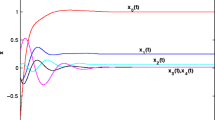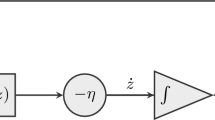Abstract
In this paper, a recurrent neural network (RNN) is used to solve a class of optimal control problems (OCPs). These problems can be transferred to a constrained optimization problem subject to linear equality constraints. To solve such problems, some terms of the first kind of Chebyshev polynomials are entered into dynamic state parametrizations instead of x(t), and then the terms are substituted into the performance index and the integral is taken from it. Finally, we have a constrained optimization problem that can be solved by an RNN. An illustrative example is presented to show the effectiveness and performance of the proposed method.
Access this chapter
Tax calculation will be finalised at checkout
Purchases are for personal use only
Similar content being viewed by others
References
Mehne, H.H., Borzabadi, A.H.: A numerical method for solving optimal control problems using state parametrization. Numer. Algor. 42, 165–169 (2006). https://doi.org/10.1007/s11075-006-9035-5
Vlassenbroeck, J.: A Chebyshev polynomial method for optimal control with state constraints. Automatica 24(4), 499–506 (1988). https://doi.org/10.1016/0005-1098(88)90094-5
Kafash, B., Delavarkhalafi, A., Karbassi, S.M.: Application of Chebyshev polynomials to derive efficient algorithms for the solution of optimal control problems. Sci. Iran. D, Comput. Sci. Eng. Electr. Eng. 19(3), 795–805 (2012). https://doi.org/10.1016/j.scient.2011.06.012
Ebadi, M.J., Hosseini, A., Hosseini, M.M.: A projection type steepest descent neural network for solving a class of nonsmooth optimization problems. Neurocomputing 235, 164–181 (2017). https://doi.org/10.1016/j.neucom.2017.01.010
Ebadi, M.J., Hosseini, M.M., Karbassi, S.M.: An efficient one-layer recurrent neural network for solving a class of nonsmooth pseudoconvex optimization problems. J. Theoret. Appl. Inf. Technol. 96(7), 1999–2014 (2018). http://www.jatit.org/volumes/Vol96No7/21Vol96No7.pdf
Ebadi, M.J., Hosseini, A., Jafari, H.: An efficient one-layer recurrent neural network for solving a class of nonsmooth optimization problems. J. New Res. Math. 6(24), 97–110 (2020). http://journals.srbiau.ac.ir/article_15615_f34599f523793828ae53dca49834f495.pdf
Heydarpoor, F., Karbassi, S.M., Bidabadi, N., Ebadi, M.J.: Solving multi-objective functions for cancer treatment by using Metaheuristic Algorithms. Int. J. Combinat. Optim. Probl. Informat. 11(3), 61–75 (2020). https://ijcopi.org/ojs/article/view/124/136
Farahani, H., Ebadi, M.J., Jafari, H.: Finding inverse of a fuzzy matrix using eigenvalue method. Int. J. Inn. Technol. Explor. Eng. 9(2), 3030–3037 (2019). https://doi.org/10.35940/ijitee.B6295.129219
Heydarpour, F., Abbasi, E., Ebadi, M.J., Karbassi, S.M.: Solving optimal control problem of cancer treatment by artificial neural networks. Int. J. Interact. Multimed. Artif. Intell. 6(4), 18–25 (2020). https://doi.org/10.9781/ijimai.2020.11.011
Radmanesh, M., Ebadi, M.J.: A local mesh-less collocation method for solving a class of time-dependent fractional integral equations: 2D fractional evolution equation. Eng. Anal. Boundary Elem. 131, 372–381 (2020). https://doi.org/10.1016/j.enganabound.2020.01.017
Stoer, J., Bulirsch, R.: Introduction to Numerical Analysis, 2nd Edn., Springer-Verlag, New York, Translated by Bartels, R., Gautschi, W., Witzgall, C. (1993). https://doi.org/10.1007/978-0-387-21738-3
Mason, J.C., Handscomb, D.C.: Chebyshev Polynomials. A CRC Press Company, United States of America (2003)
Barbarosou, M.P., Maratos, N.G.: A nonfeasible gradient projection recurrent neural network for equality-constrained optimization problems. IEEE Trans. Neural Networks 19(10), 1665–1677 (2008). https://doi.org/10.1109/TNN.2008.2000993
Rivlin, T.J.: Chebyshev Polynomials. Wiley, New York (1990)
Watkins, W., Zeitlin, J.: The Minimal Polynomial of \(cos(2\pi /n)\). Amer. Math. Monthly 100, 471–474 (1993). https://doi.org/10.2307/2324301
Zwillinger, D. (ed.): CRC Standard Mathematical Tables and Formulae. CRC Press, Boca Raton (1995)
Feldbaum, A.: Principes théoriques des systèmes asservis optimaux. Mir, Moscow (1973)
Author information
Authors and Affiliations
Corresponding author
Editor information
Editors and Affiliations
Rights and permissions
Copyright information
© 2021 The Author(s), under exclusive license to Springer Nature Switzerland AG
About this paper
Cite this paper
Ebadi, M.J., Jafari, H. (2021). Solving a Class of Optimal Control Problems by Using Chebyshev Polynomials and Recurrent Neural Networks. In: Allahviranloo, T., Salahshour, S., Arica, N. (eds) Progress in Intelligent Decision Science. IDS 2020. Advances in Intelligent Systems and Computing, vol 1301. Springer, Cham. https://doi.org/10.1007/978-3-030-66501-2_15
Download citation
DOI: https://doi.org/10.1007/978-3-030-66501-2_15
Published:
Publisher Name: Springer, Cham
Print ISBN: 978-3-030-66500-5
Online ISBN: 978-3-030-66501-2
eBook Packages: Intelligent Technologies and RoboticsIntelligent Technologies and Robotics (R0)




